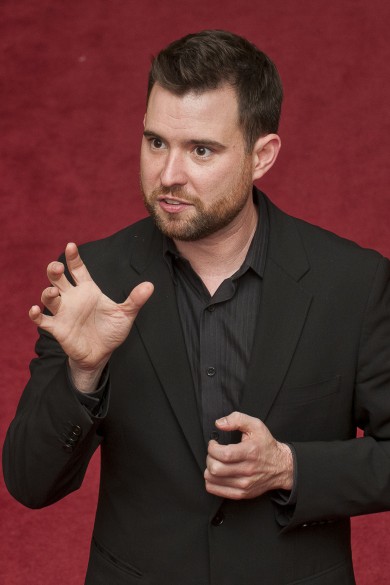Haydn’s “Seven Last Words” finds luminous expression with Seraphic Fire and Spektral Quartet

Haydn’s The Seven Last Words of Christ on the Cross is a luminous, compact jewel, a deeply felt, subtly colored contemplation of Christ’s crucifixion that lasts less than an hour.
Wednesday night two gifted ensembles—the Florida-based a cappella chorus Seraphic Fire and Chicago’s own Spektral Quartet—combined forces for an unusual and potent version of Haydn’s work at Rockefeller Chapel in the University of Chicago Presents series.
After composing the Seven Last Words as a full orchestral piece for a Good Friday service in 1787, Haydn rearranged it for string quartet, for solo piano and eventually for chorus. At Rockefeller Chapel Seraphic Fire and the Spektral Quartet performed a new arrangement blending the choral and string quartet versions, which required some editing of Haydn’s originals by Chicago-based arranger Joe Clark. Conducted by Quigley, the performance offered a finely balanced blend of heartfelt singing and expressive string playing. Surprisingly, the mix of forces emerged clear and well balanced with Rockefeller Chapel’s resonant acoustic not muddying the sound.
The Spektral Quartet performed The Seven Last Words alone in Rockefeller Chapel in March 2013, and as a resident ensemble at the University of Chicago, they know how to adjust their performance for the chapel’s acoustics. Each instrumental line, especially the sweet but steely sound of Aurelien Fort Pederzoli’s solo violin, was clear, but the overall texture had a velvet edge. In the sixth movement (“Jesus cried out: I thirst”) of the nine-movement piece, the plucked violins and violas sounded like guitars gliding through a hushed lullaby. This was religious meditation with a gentle edge rather than the sharp angles and angry undercurrent of heaven-storming fire and brimstone.
The 13-voice Seraphic Fire is aptly named. In the slow, almost motionless passages that opened several movements, their voices unfurled in a rich chant full of wonder and, often, pain. When a solo voice, especially a glowing soprano, took flight, the sense of hope and tenderness was palpable.
The evening opened with Seraphic Fire performing “O Nata Lux,” a radiant movement from Morten Lauridsen’s Lux Aeterna in memory of Paul Salamunovich, music director emeritus of the highly distinguished Los Angeles Master Chorale, who died April 3
The evening had special resonance for both the performers and the audience. Between 1988 until they disbanded in 2007, the esteemed Vermeer Quartet gave virtually annual performances of the Seven Last Words during Holy Week in Chicago. Marc Johnson, the Vermeer’s long-time cellist, died April 8, and the Spektral players dedicated their performance to his memory. (The Vermeer, performing with cellist Kurt Baldwin, performed the Seven Last Words Tuesday night at Dominican University in River Forest.)
Posted in Performances


